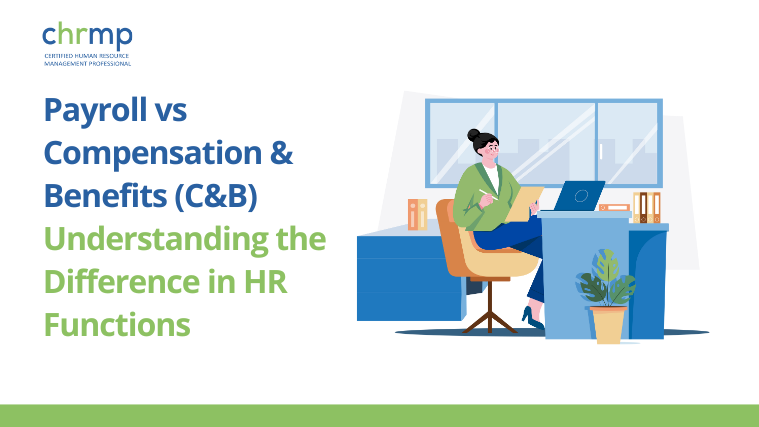
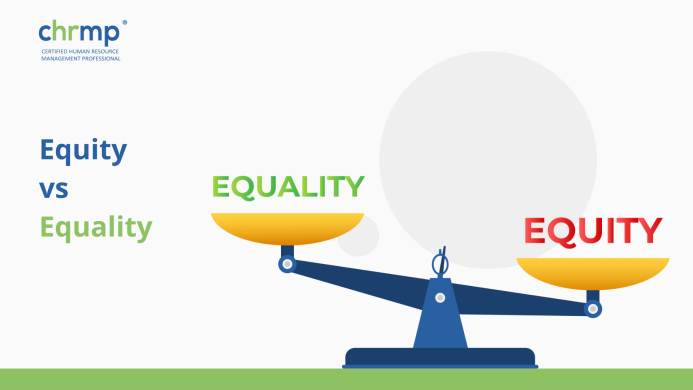
In the ever-evolving industrial landscape, there is a growing emphasis on justice and fairness, including issues of equity and equality.
The terms equity and equality are often used interchangeably, yet, they have significant differences and distinct meanings and implications in HRM.
In this blog, we shall explore the definitions of equity and equality, their importance, and several other relevant topics. So whether you’re a newcomer to the world of HRM or someone just looking to expand your knowledge, this blog is for you!
So without further ado, let’s get started!
Equity in human resource management refers to fair and just treatment of employees and considering their individual needs, circumstances, and contributions to the company’s success.
Equity is based on the principle that all employees should receive appropriate recognition and be rewarded accordingly for their work, regardless of factors like race, age, gender, religion, etc.
Equity in HRM involves several strategies and practices ensuring adequate pay and benefits for individual employee skills, experience and performance, providing ample opportunities for growth and development for each employee, and promoting diversity and inclusion in the workplace.
Equity is essential to running an organization as it ensures that every employee receives fair and just treatment and that their individual needs, circumstances and contributions are accounted for.

Equity promotes positivity and inclusion in the workplace culture, increases employee engagement and productivity, and helps reduce attrition rates while attracting and retaining top talent. It also helps reduce employee turnover rates and promote a sense of loyalty in the workplace, leading to long-term organizational success.
Equity also helps managers identify and address any biases and barriers like discrimination based on gender, religion or age, harassment or a lack of representation within the company and take appropriate measures to eradicate them.
Equality refers to equal and consistent treatment of all individuals regardless of personal characteristics, including gender, age, disability, circumstances, etc. In HR, equality means that all employees receive equal treatment regarding opportunities, benefits, payment, training and career development.
However, it is worth remembering that treating every employee exactly the same might not always result in the favourable outcome you’re looking for.
This is because each employee has different personal circumstances and requirements. Treating every employee equally without considering their individual needs may make it difficult for them to perform their duties efficiently.
Here’s where equity gains precedence, as it focuses on providing equal opportunities and support to employees while considering their requirements to help them succeed.
A combination of equality and equity can create a more just and inclusive workplace where all employees have the opportunity to succeed based on their skills, experience, and performance.
Equality is important in HR as it ensures that all employees are treated fairly and consistently, regardless of their characteristics.
Promoting equality creates a diverse and inclusive workplace, improves employee morale, motivation, and productivity, and attracts and retains top talent. By treating all employees equally, organizations can comply with legal requirements and create a positive reputation in the marketplace.
However, it is important to recognize that equality alone may not always result in fairness or justice. Equity must also be considered to provide support and resources to address individual needs and circumstances.
In summary, promoting equality in HR is important for creating a positive and inclusive workplace culture, ensuring fairness and justice in employee treatment, and achieving organizational success.
Equity and equality share some important similarities. Both concepts are focused on promoting fairness and inclusivity, ensuring that all individuals are treated without discrimination or bias based on their personal characteristics.

They aim to create a workplace that values diversity and recognizes the unique experiences and perspectives of individuals from different backgrounds.
Furthermore, both equity and equality are crucial for achieving organizational success by improving employee morale, creating a positive workplace culture, and attracting and retaining top talent.
While they have some differences, the shared focus on promoting fairness and inclusivity makes equity and equality important for any organization to consider in its HR policies and practices.
Equity and equality are two related but distinct concepts. While both terms are often used interchangeably, they have different meanings and implications.
Equality refers to treating all individuals in the same way, regardless of their differences or circumstances. It promotes fairness and consistency by providing everyone with the same opportunities, resources, and treatment.
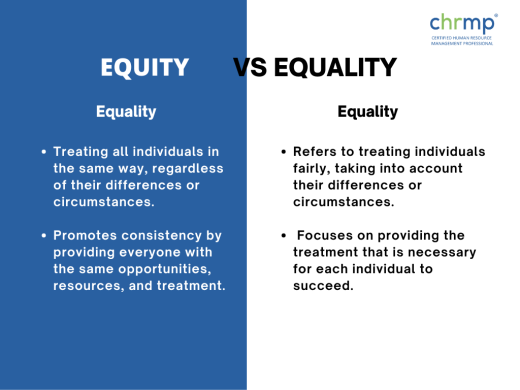
In HR, equality means providing all employees with the same benefits, pay, and opportunities for training and development, regardless of their personal characteristics.
On the other hand, equity refers to treating individuals fairly, considering their differences or circumstances.
It recognizes that different people may have different needs or barriers to success and thus requires providing support and resources to address these differences.
In the context of HR, equity means providing employees with what they need to succeed based on their individual circumstances, such as providing accommodations for disabilities or offering flexible work arrangements for working parents.
In summary, while equality focuses on providing the same treatment to all individuals, equity focuses on providing the treatment necessary for each individual to succeed.
While both concepts are important in promoting fairness and inclusivity, organizations must recognize that achieving equity may require going beyond treating everyone equally and providing targeted support to address individual needs and circumstances.
Here are five key areas where equity vs. equality matters in the workplace:
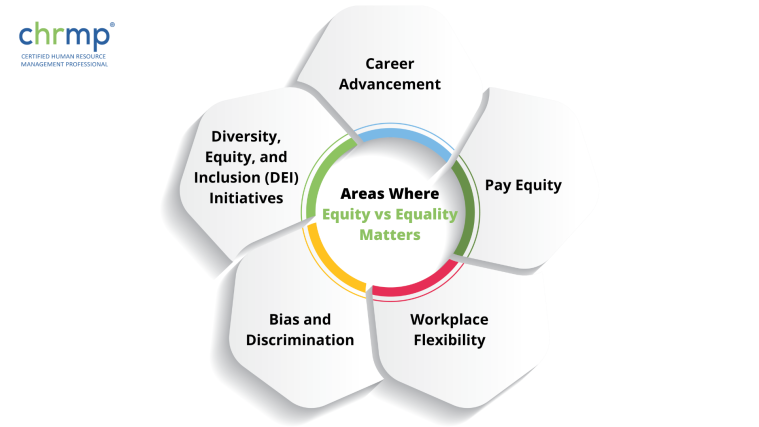
1. Pay equity:
Pay equity is a key issue regarding equity vs equality in the workplace. Although laws exist to protect against pay discrimination, there are still disparities in pay based on gender, race, and other factors. Addressing pay equity requires organizations to examine their pay structures and make changes where necessary to ensure that all employees are paid fairly for their work.
2. Diversity, Equity, and Inclusion (DEI) Initiatives:
Creating a diverse, equitable, and inclusive workplace is crucial for promoting equity and equality. DEI initiatives involve creating an environment where all employees feel valued and included, regardless of their background or identity. This requires organizations to actively recruit and retain diverse talent, provide training on unconscious bias and cultural competence, and create a workplace culture that is welcoming and respectful to all
3. Bias and Discrimination:
Bias and discrimination can take many forms in the workplace, including hiring and promotion decisions, pay and benefits, and day-to-day interactions with colleagues. Addressing bias and discrimination requires organizations to implement policies and practices that promote equity and equality and training programs to raise awareness of these issues.
4. Workplace Flexibility:
Workplace flexibility is important in promoting equity and equality in the workplace, as it allows employees to balance work and personal responsibilities. Flexible work arrangements, such as telecommuting, flexible schedules, and job sharing, can benefit employees with caregiving responsibilities or other commitments outside of work and can help to reduce the gender pay gap.
5. Career Advancement:
Career advancement is another area where workplace equity vs equality comes into play. Organizations must ensure that all employees have equal opportunities to advance in their careers, regardless of their background or identity. This requires implementing policies and practices that support career development and growth and addressing any barriers that may be preventing certain groups of employees from advancing.
Now that it’s clear that equity should precede equality, you might wonder how to transition your workplace environment to one that leans more towards equity.
Here are five easy steps that you can take to transition from equality to equity:
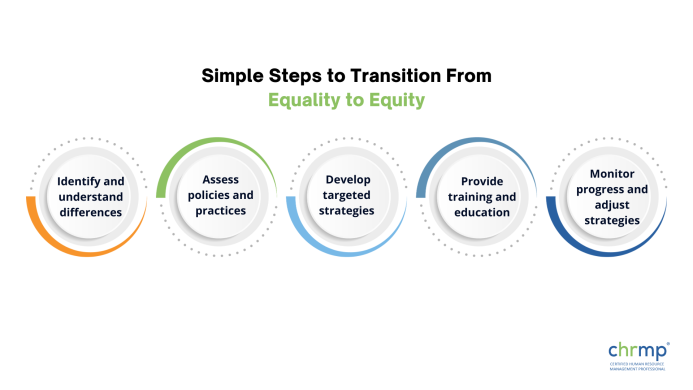
1. Identify and understand differences: Start by identifying and understanding the differences among employees, such as their backgrounds, experiences, and needs. This can be done through employee surveys, focus groups, or other methods.
2. Assess policies and practices: Once differences have been identified, assess your organization’s policies and practices to determine if they are meeting the needs of all employees. Are there any barriers or biases that may be preventing certain employees from succeeding?
3. Develop targeted strategies: Based on the assessment, develop targeted strategies to address the unique needs and circumstances of different groups of employees. For example, if working parents are struggling to balance work and family responsibilities, consider offering flexible work arrangements or childcare benefits.
4. Provide training and education: Provide training and education to employees and managers to raise awareness about the importance of equity and how it can be achieved. This can include training on diversity and inclusion, bias awareness, and cultural competency.
5. Monitor progress and adjust strategies: Finally, monitor progress and adjust strategies as needed to ensure that equity is achieved. This can include collecting employee feedback, analyzing data on diversity and inclusion, and adjusting policies and practices to address any gaps or challenges.
By following these steps, organizations can move beyond equality to achieve equity, creating a workplace where all employees have the support and resources they need to succeed.
What is the difference between equity and equality?
Answer: Equality means treating everyone the same, while equity means providing individuals with what they need to succeed based on their circumstances.
Why is equity important in the workplace?
Answer: Equity is important in the workplace because it promotes fairness and inclusivity by recognizing and addressing different individuals’ unique needs and circumstances.
How can organizations achieve equity?
Answer: Organizations can achieve equity by identifying and understanding employee differences, assessing policies and practices, developing targeted strategies, providing training and education, monitoring progress and adjusting strategies as needed.
What is the role of HR in promoting equity and equality?
Answer: HR plays a critical role in promoting equity and equality by developing policies and practices that are fair and inclusive, providing training and education to employees and managers, and monitoring progress towards achieving equity and equality.
How can individuals promote equity and equality in the workplace?
Answer: Individuals can promote equity and equality in the workplace by recognizing and addressing biases, advocating for inclusive policies and practices, and participating in training and education on diversity and inclusion.
How do equity and equality contribute to organizational success?
Answer: Equity and equality contribute to organizational success by creating a positive workplace culture, improving employee morale and satisfaction, attracting and retaining top talent, and promoting innovation and creativity through diverse perspectives and experiences.
In conclusion, understanding the difference between equity and equality is crucial for promoting fairness and inclusivity in the workplace.
While equality aims to treat everyone equally, it fails to recognize that individuals have different needs and circumstances.
Here’s where equity comes in. Equity seeks to provide all employees with the resources and support they need to succeed by taking into consideration their individual requirements.
Achieving equity requires a concerted effort from individuals and organizations through targeted strategies, education and training, and ongoing monitoring and adjustment.
By prioritizing equity and equality in the workplace, organizations can create a culture that values diversity and inclusivity, attracts and retains top talent, and fosters innovation and success.
© 2007-2025 CHRMP| All Rights Reserved | Powered by Ripples Learning & Research Private Limited
